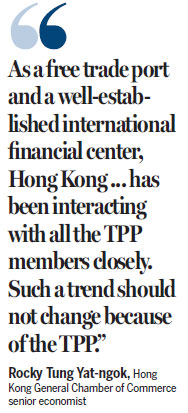TPP 'won't help Vietnam realize' its regional hub dream
Updated: 2015-10-08 09:17
By Luo Weiteng in Hong Kong(HK Edition)
|
|||||||||
The newly concluded 12-nation Trans-Pacific Partnership (TPP) pact may give the world another good reason to bet big on Vietnam - Asia's so-called new manufacturing powerhouse - but it's still hard to imagine Vietnam can replace China as the region's production hub, experts say.
Vietnam, the only participating nation that is considered "lower middle income" by the World Bank, is poised to benefit most, in particular, its manufacturing industry, from the controversial trade deal.
In the face of mounting wage rises in China - the world's main manufacturing center - factories have been enticed by Vietnam's lower labor costs, at about 60 percent of Chinese mainland levels, and its location in the heart of Asia.

Alan Lee Yuk-lun, president of the Hong Kong Commerce and Industry Associations, noted that China's status as the world's factory is dealing with a spirited challenge by would-be contenders, like Vietnam, for the crown in low-end production, a trend that will inevitably intensify under the Pacific-wide partnership deal.
But, he told China Daily that lower labor costs are by no means the whole story.
Nowadays, manufacturing sectors in Southeast Asian countries still lag far behind the Chinese mainland in terms of quality control and the workforce's level of skill set, observed Lee, who estimated it will take at least another decade for Vietnam to meet the standards of high-end manufacturing business.
Lured by Vietnam's cheap labor force, Lee used to run a middle-end apparel factory with his friends in the Indochinese nation, where he was very much upset with the quality of the local workforce.
His business took a big hit with anti-Chinese demonstrations breaking out in Vietnam in recent years, and he could hardly recruit new workers who are brave enough to work there.
Despite the compensation and preferential policies offered by the Vietnamese government, Lee continues to use the Chinese mainland as the manufacturing base for his business. He dismissed the idea of doing business again in Vietnam, where he thinks political instability is another big concern.
Hong Kong General Chamber of Commerce senior economist Rocky Tung Yat-ngok said he doesn't buy the argument that China will lose out to Vietnam following the TPP deal.
He pointed out that, at this stage, China is still ahead of others in terms of quality and availability of labor and necessary infrastructure, the network of the production base, domestic market potentials, and proximity to consumers, which means some businesses still prefer having at least part of the production base in China.
"As a free trade port and a well-established international financial center, Hong Kong has been a member of Asia-Pacific Economic Cooperation forum since November 1991, and has been interacting with all the TPP members closely. Such a trend should not change because of the TPP," he said.
Hong Kong Trade Development Council principal economist Daniel Poon Wing-choi is confident that Hong Kong will benefit from any agreement that includes the Chinese mainland, including any Free Trade Area, the Regional Comprehensive Economic Partnership or a version of the TPP with China as a signatory.
sophia@chinadailyhk.com
(HK Edition 10/08/2015 page9)